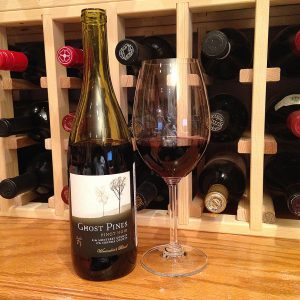Dark red-ruby color; cherry, plum on the nose; big ripe cherry attack, strawberry, vanilla on the palate.
Medium body, plush texture, reserved tannins, reserved acidity (3.7 pH), rich, round, and tasty.
Ghost Pines Pinot Noir is 100% pinot noir grapes, de-stemmed, not crushed, two-day cold soak, fermented in stainless, aged in French and American oak. This is another Gallo brand made with grapes gathered from various vineyards—63% Monterey County and 37% Sonoma County. Gallo is good at this technique, and winemaker Aaron Piotter knows how to source good grapes and deliver a good bottle at fair price. He asserts his wines “embody the progressive spirit of California winemaking: no boundaries, no limits.” And “multi-region sourcing allows us to choose the best grapes for our wines, regardless of traditional winegrowing boundaries.”
That said, Sonoma County grapes appear in most Ghost Pines wines. Sonoma is where Piotter grew up and where the winery is located (Healdsburg). Piotter is an experienced winemaker: he worked in the cellars at Sebastiani while going to school; after graduation from UC-Davis he worked at Viansa, Franciscan Estates (with their Mt. Veeder, Quintessa, Estancia brands), then Ferrari-Carano before joining Ghost Pines-Gallo.
The winery gets its name from indigenous grey pines that loom along the hillsides in Napa County. Native to California, ghost pines adapt to a variety of climates and soils, much like grapevines. Some of the fruit for Ghost Pines comes from the Ghost Pines Vineyard started by Louis P. Martini (son of Louis M. Martini) in 1964, but the Louis M. Martini company does not own Ghost Pines Winery, E.&J. Gallo Winery does. Don’t you love the intermingling of grand families of California wine in California wines.
Ghost Pines Pinot Noir Winemaker’s Blend 2013 is no ethereal, light pinot noir. It is big California. Big fruit, some oak, some attitude, very easy drinker. $19-23
Second photo: Ghost Pines winemaker Aaron Piotter.


